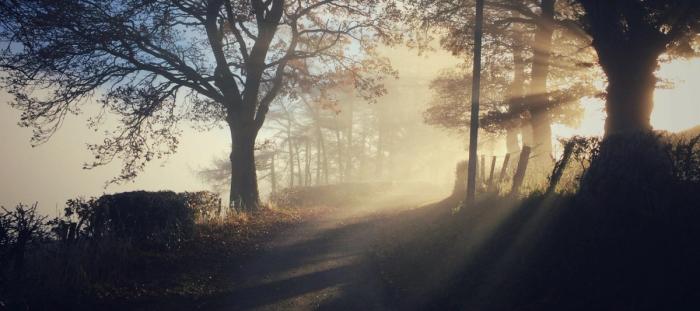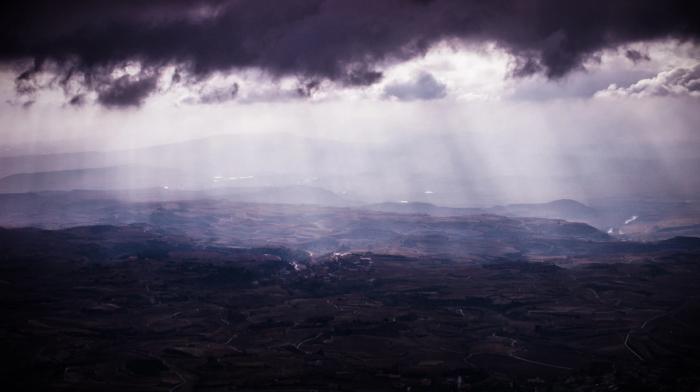Seeing Beauty
Our witness to creation always demands a personal response. This beauty that we see all around us—how should we respond? And what is our responsibility as a result?
First, attention: attend to creation. Beauty is designed to stop us in our tracks. God has put his splendor into the world so that we will set aside everything else for the moment and behold his wonders. The psalmist said,
On the glorious splendor of your majesty,
and on your wondrous works, I will meditate. (Ps. 145:5)
Wise Christians have always been intentional about slowing down and taking time to enjoy the world around them. Augustine exhorted, “Some people read books in order to find God. But the very appearance of God’s creation is a great book. Look above you! Look below you! Take note! Read!”[1]
A marvelous example of looking above and below is the C. S. Lewis scholar Clyde S. Kilby, who made a series of personal resolutions, or daily principles he purposed to live by. The first was this: “At least once every day I shall look steadily up at the sky and remember that I, a consciousness with a conscience, am on a planet traveling in space with wonderfully mysterious things above me and about me.” Dr. Kilby’s sixth resolution is similarly attentive to the wonders of creation:
I shall open my eyes and ears. Once every day I shall simply stare at a tree, a flower, a cloud, or a person. I shall not then be concerned at all to ask what they are but simply be glad that they are. I shall joyfully allow them the mystery of what Lewis calls their “divine, magical, terrifying and ecstatic” existence.[2]
Adoring Beauty
Kilby’s resolutions invite us to do more than notice the world around us: we should enjoy it! Another good example to follow is the English essayist, biographer, and lay theologian G. K. Chesterton, who wrote in one of his letters, “I do not think there is anyone who takes quite such a fierce pleasure in things being themselves as I do. The startling wetness of water excites and intoxicates me: the fieriness of fire, the steeliness of steel, the unutterable muddiness of mud.”[3]
Even if we are not all called to be scientists, all of us can become—like Chesterton and Kilby—amateur naturalists who are easily arrested by the beauty of creation and attend to its daily splendors. This will not only increase our enjoyment of everyday life, but it will also lead us to praise our Maker. It was said of Saint Francis of Assisi: “In beautiful things he saw Beauty itself and through his vestiges imprinted on creation he followed his Beloved everywhere.”[4]
Like Francis, we too should follow beauty to its ultimate source and turn our attention into adoration. This is what David does in Psalm 19: he lets creation’s pleasures lead him to praise. When the king says, “The heavens declare the glory of God,” he is not simply describing something; he is celebrating it. This is what the Bible does whenever it talks about the beauties of creation. God is to be honored, God is to be praised, God is to be worshiped for the worlds he has made. Jonathan Edwards rightly said, “God is glorified not only by His glory’s being seen, but by its being rejoiced in.”[5]
Sometimes atheists and other skeptics talk about the difficult questions they demand to have answered before they will believe in God, such as the so-called problem of evil. These hard questions do deserve good answers. But unbelievers also have some challenges of their own that they need to face, and one of them is the problem of wonder. Everyone can see the beauty in this world, even when it is broken. Such beauty surely requires a beautifier. Yet when skeptics see the world’s beauty, they have no one to thank for it and no one to praise. How frustrating it must be to receive the gift of beauty and yet be unable to acknowledge it properly.
One of our everyday privileges as believers in Christ is knowing whom to worship. C. S. Lewis once said that in the experience of enjoying the world’s beauty, he tried “to make every pleasure into a channel of adoration.”[6] John Piper took Lewis’s channel and widened it:
We don’t just stand outside and analyze the natural world as a beam [of sunlight], but let the beam fall on the eyes of our heart, so that we see the source of the beauty—the original beauty, God himself. . . . All of God’s creation becomes a beam to be “looked along” or a sound to be “heard along” or a fragrance to be “smelled along” or a flavor to be “tasted along” or a touch to be “felt along.” All our senses become partners with the eyes of the heart in perceiving the glory of God through the physical world.[7]
Anyone can perceive God’s glory in creation—not just scientists and theologians. A notable example comes from Abigail Adams, the second first lady of the United States.[8] On a trip across the Atlantic Ocean—in the calm that followed a turbulent storm—Adams witnessed the stunning beauty of the bioluminescent sea creatures that surrounded the ship for miles in every direction. As she looked out in ecstatic wonder on a phosphorescent ocean, she found herself quietly murmuring these words of praise: “Great and marvelous are thy works, Lord God Almighty; in wisdom hast thou made them all” (cf. Ps. 104:24).
[1] Augustine, quoted in Taylor, Theater, 60.
[2] Clyde S. Kilby, “A Means to Mental Health,” Marion E. Wade Center, 2011, accessed July 5, 2022, https://www.wheaton.edu/. For more on Kilby, see “Clyde S. Kilby,” Marion E. Wade Center, accessed July 5, 2022, https://www.wheaton.edu/.
[3] G. K. Chesterton, quoted in Thomas Dubay, The Evidential Power of Beauty: Science and Theology Meet (San Francisco: Ignatius, 1999), 175–76.
[4] Bonaventure, The Life of Saint Francis, quoted in James Fodor, “The Beauty of the Word Re-membered: Scripture Reading as a Cognitive/Aesthetic Practice,” in The Beauty of God: Theology and the Arts, ed. Daniel J. Treier, Mark Husbands, and Roger Lundin (Downers Grove, IL: IVP Academic, 2007),173n30.
[5] Jonathan Edwards, Miscellanies, quoted in Belden C. Lane, Ravished by Beauty: The Surprising Legacy of Reformed Spirituality (Oxford: Oxford University Press, 2011), 175.
[6] C. S. Lewis, Letters to Malcolm: Chiefly on Prayer (New York: Harcourt, 1992), 89.
[7] John Piper, When I Don’t Desire God: How to Fight for Joy (Wheaton, IL: Crossway, 2004), 184–85.
[8] This story is recounted briefly in David McCullough, John Adams (New York: Simon & Schuster, 2001), 295.
Content taken from Beauty Is Your Destiny: How the Promise of Splendor Changes Everything by Philip Graham Ryken, ©2023. Used by permission of Crossway, a publishing ministry of Good News Publishers.






